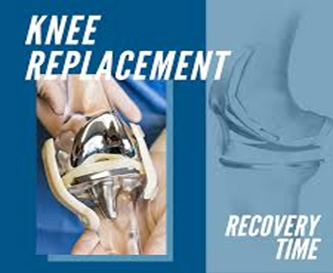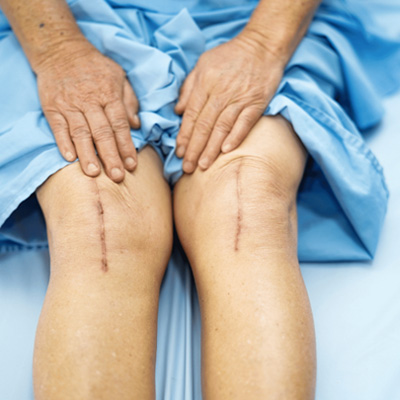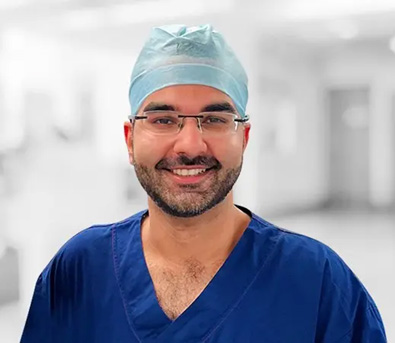Have you or your loved one been advised to undergo knee replacement surgery? Wondering what the recovery journey looks like? You're not alone! In India, over 2 lakh knee replacement surgeries are performed annually, with a success rate of nearly 95%. While knee replacement can significantly improve mobility and quality of life, recovery is a crucial phase that requires patience, dedication, follow up and the right medical support.

What is Knee Replacement? What Are Its Types?
Knee replacement, also known as knee arthroplasty, is a surgical procedure to replace a damaged knee joint with an artificial implant. It is typically recommended for patients with severe arthritis, injury, or chronic knee pain that affects daily activities.
Types of Knee Replacement:
- Total Knee Replacement (TKR): The entire knee joint is replaced with artificial components.
- Partial Knee Replacement (PKR): Only the damaged portion of the knee is replaced, preserving healthy bone and tissue.
- Minimally Invasive Knee Replacement: A less invasive technique that reduces recovery time.
- Robotic-Assisted Knee Replacement: Uses robotic technology for greater precision and faster recovery.
What Happens Immediately After Surgery?
Right after surgery, you’ll be in the recovery room for monitoring. Doctors and nurses will check your vitals, and pain management will begin. You may have a bandage over the incision and might be using a knee brace or compression device to prevent blood clots. You will also receive antibiotics to prevent infection.

How Soon Can You Start Moving?
Most patients are encouraged to start moving within 24 hours post-surgery. A physiotherapist will help you with gentle leg movements to prevent stiffness and promote circulation. Early movement also reduces the risk of blood clots. By the second day, you may start sitting up and standing with support.
What’s the First Week Like?
- Pain and swelling are normal but managed with medication.
- Assisted walking begins only for the first walk.
- Physical therapy starts to restore mobility and flexibility.
- Regular dressing changes are needed to keep the incision clean.
- Ice packs and elevation help reduce swelling.
- Follow your surgeon’s advice on home exercises and precautions.
When Can You Walk Without Assistance?
From the next day of surgery, many patients can walk short distances without a walker. However, stairs and uneven surfaces may still be challenging. Strength and balance exercises will help improve mobility. Full independence in walking typically comes after 2- 4 weeks with proper physiotherapy.
How Long Does It Take for the Stitches to Heal?
Stitches or staples are usually removed within 10-14 days. Keeping the wound clean and dry is crucial to prevent infection. Avoid soaking the incision in water until it fully heals. Your doctor will check for any signs of infection or complications during follow-ups.
When Can You Start Driving Again?
Most people can start driving in 4-6 weeks, provided they have regained enough strength and flexibility in their knee. The ability to make quick movements without pain is crucial. It is recommended to get clearance from your doctor before resuming driving.
How Long Does Pain Last After Surgery?
Pain levels vary, but significant pain reduction is usually noticed within 2 weeks. Pain management includes medications, ice packs, and therapy. Some mild discomfort may persist for a few months, but with regular exercise and proper care, it will improve.
What Exercises Should You Do at Home?
- Heel slides to improve knee flexibility.
- Straight leg raises to strengthen thigh muscles.
- Gentle stretches to improve mobility.
- Ankle pumps to enhance blood circulation.
- Stationary cycling (as recommended by the doctor) to maintain movement.
Can You Climb Stairs After Surgery?
Initially, stair climbing may be challenging, but with 1-2 weeks of physiotherapy, you can manage stairs with support. Always use a railing or cane for stability. Strengthening exercises will help you regain confidence in stair climbing.
What Are the Signs of Recovery Progress?
Key milestones include reduced pain, increased range of motion, and improved walking ability. Swelling should gradually decrease, and you should feel stronger each week. Regular follow-ups with your surgeon will track your progress.
How Long Before You Can Resume Work?
Office workers may return in 2 weeks, while physically demanding jobs may require 1 months. If your job involves heavy lifting or prolonged standing, discuss with your doctor about modifications or alternative duties.
When Can You Resume Exercise and Sports?
Low-impact activities like jogging and swimming can be started by 3-4 weeks, but high-impact sports should be avoided for at least 6 months. Activities like cycling and yoga may be incorporated under medical supervision.
What Diet Helps Recovery?
A diet rich in proteins, vitamins, and minerals helps with healing. Foods like lean meats, dairy, leafy greens, nuts, and whole grains are beneficial. Staying hydrated and avoiding excessive salt or sugar is also recommended.
How Can You Prevent Blood Clots?
- Wear compression stockings to improve circulation.
- Stay active and move regularly, even while seated.
- Take prescribed blood thinners as recommended by your doctor.
- Avoid prolonged sitting or lying down to reduce clot risks.
- Follow your physiotherapy exercises for better mobility.
Is Physiotherapy Necessary?
Yes! Physiotherapy ensures better movement, faster recovery, and long-term success of the surgery. Regular sessions help improve flexibility, strengthen muscles, and prevent stiffness.
What If You Experience Complications?
Signs like severe pain, swelling, fever, or wound infection should be reported to your surgeon immediately. Early intervention prevents complications from worsening.
How Much Does Knee Replacement Surgery Cost in India?
The cost of knee replacement surgery in India varies based on hospital, location, and implant type. On average, it ranges from ₹1.5 lakh to ₹4 lakh per knee.
Who Is the Best Doctor for Knee Surgery in Mumbai?
- Dr. Supreet Bajwa is a top knee replacement surgeon in Mumbai with advanced training in India and Australia.
- Fellowship-trained in Hip & Knee Joint Replacement with expertise in primary and revision surgeries.
- Specialized in Direct Anterior Minimally Invasive Hip Replacement, ensuring faster recovery and minimal post-op restrictions.
- Expert in Robotic Arm-Assisted Knee Replacement Surgery for precise and minimally invasive procedures.
- Only orthopaedic surgeon in Mumbai performing Cooled Radiofrequency Ablation for chronic hip and knee pain.
- Over 10+ years of experience and 1300+ successful Hip & Knee Replacement surgeries.
- Consults at Wockhardt Hospital (Mumbai Central & Mira Road), Bajwa Orthopedic Specialist Services Clinic.

Recovering from knee replacement surgery requires patience, dedication, and expert medical care. With the right post-operative care, physiotherapy, and guidance from specialists, patients can regain mobility and lead a pain-free life. Dr. Supreet Bajwa, a leading knee replacement surgeon in Mumbai, specializes in advanced surgical techniques for faster recovery. For expert consultation and treatment, visit Bajwa Orthopedic Specialist Services Clinic or book an appointment at Wockhardt Hospital.


